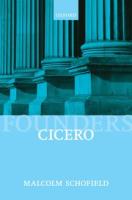
Founders of modern political and social thought
OUP (2021) p/b 285pp £21.99 (ISBN 9780199684922)
Julius Caesar is reported to have said, in praise of Cicero, that advancing the frontiers of the Roman mind rather than its empire was the more significant achievement. High praise indeed, since Caesar was speaking of one of the greatest imperial powers in world history, but Malcolm Schofield has now given us the ideal introduction to Cicero’s political thought to help explain that judgement. His book on Cicero appears in a series entitled ‘Founders of Modern Political and Social Thought’, designed to provide ‘a clear, accessible, historically informed account of each thinker’s work, focussing on a reassessment of the central ideas and arguments.’
S. meets these criteria admirably. He argues that Cicero’s work in political philosophy represents the first surviving attempt to articulate a systematic rationale for republicanism and give a sustained account of its different elements. He focusses his attention on Cicero’s three major texts on the subject: On the Commonwealth, On Laws and On Duties. He structures the book, however, not on an exposition of each of these in turn but on their major themes and topics, which enables him to bring out more clearly both the contemporary historical context in which Cicero was working and the resonances his ideas have had in later political philosophy. Cicero was, for example, much admired and invoked by leading figures in the eighteenth-century Enlightenment, by the American Founding Fathers and by supporters of the French Revolution; while today there is a resurgence of interest in Roman ideas of political freedom, inspired particularly by the work of Quentin Skinner and Philip Pettit.
Cicero was of course an active and influential participant in the political life of the day, which adds an important dimension to his philosophical theories. And he has left us such a volume and variety of his writings—in his forensic and political speeches, theoretical treatises and extensive personal correspondence—that we probably know more about his thoughts and daily activities than anyone else in classical antiquity. S. begins with an Introduction to the contexts of his life and work, then proceeds to the major themes of his political philosophy. There are chapters successively on: Liberty, Equality and Popular Sovereignty; Government; Cosmopolitanism, Imperialism and the Idea of Law; Republican Virtues; and Republican Decision-making. There is then a concluding Epilogue on the fundamental question of the relationship between philosophical theory and public policy, relating Cicero’s pioneering ideas to modern debates on this vexed question. S. is very careful to avoid anachronistic comparisons, but Cicero emerges as a massive if flawed influence on the later Western tradition.
The book is marked throughout by very thoughtful attention to the needs of the non-specialist reader. In particular, there are careful discussions of key Latin terms and their possible translations, for example the term res publica itself (pp.47-49). S. explains why it is misleading, though common, to translate that as ‘state’ or ‘republic’, and prefers to think of it as the res populi or ‘people’s business’, so translating the dialogue De Republica as On the Commonwealth. There are ample references, too, for those who wish to pursue any topic further, though it might have been useful in the bibliographical notes to have had a short section aimed at students on the best modern translations of the relevant texts.
There is a massive scholarly literature on Cicero, but S. has managed to produce a concise and judicious guide to all the main issues and debates. It is far more than just a clear summary, though. It is, in the best sense, a critical introduction, one that engages as well as informs the reader, and it now takes its place as the best modern account of its kind.
Jeremy Mynott
